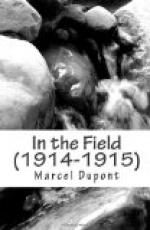I. HOW I WENT TO THE FRONT
The train was creeping along slowly in the soft night air. Seated on a truss of hay in the horse-box with my own two horses and that of my orderly, Wattrelot, I looked out through the gap left by the unclosed sliding door. How slowly we were going! How often we stopped! I got impatient as I thought of the hours we were losing whilst the other fellows were fighting and reaping all the glory. Station after station we passed; bridges, level crossings, tunnels. Everywhere I saw soldiers guarding the line and the bayonets of the old chassepots glinting in the starlight. Now and again the train would suddenly pull up for some mysterious reason. The three horses, frightened at being brought into collision with each other, made the van echo to the thunder of their hoofs as they slipped, stamped, and recovered their balance. I got up to calm them with soothing words and caresses. By the light of the wretched lantern swinging and creaking above the door I could see their three heads, with pricked ears and uneasy eyes. They were breathing hard and could not understand why they had been brought away from their comfortable stable with its thick litter of clean straw. They were not thinking about the war, but they seemed to understand that their good times were over, that they would have to resign themselves to all sorts of discomforts, march unceasingly, pass nights in camps under the pouring rain, keep their heavy equipment on their backs for many days together, and not always get food when they were hungry.
Then the train would set off again with a noise of tightened couplings and creaking waggons. Whilst I was mechanically looking out at the darkness, dotted here and there with the coloured lights of the signals placed along the line, my straying thoughts would wander to the fields of battle and try to picture the scene on my arrival at the Front.
It was the 28th of August, nearly a month after the order had been given for mobilisation. And the armies had been fighting for some days already. What had happened? We could only glean part of the truth from the short official announcements. We knew there had been hard fighting at Charleroi, at Dinant, and in the direction of Nancy. But the result had not been defined. I thought I could guess, however, that these battles had not been decisive, but that they had cost both sides dear. I was tempted to rejoice, fool that I was, to think that the first great victories would not be won before I joined my regiment. I had not yet been able to console myself for the ill-fortune that prevented me from starting with the squadrons of the first line. And yet I had to submit to regulations. The colonel was inflexible, and answered my entreaties by quoting the inexorable rule: In every cavalry regiment the sixth lieutenant in order of seniority must stay at the depot to help the major and the captain of the 5th squadron. They must assemble, equip, and train the reserve squadrons of the regiment.




